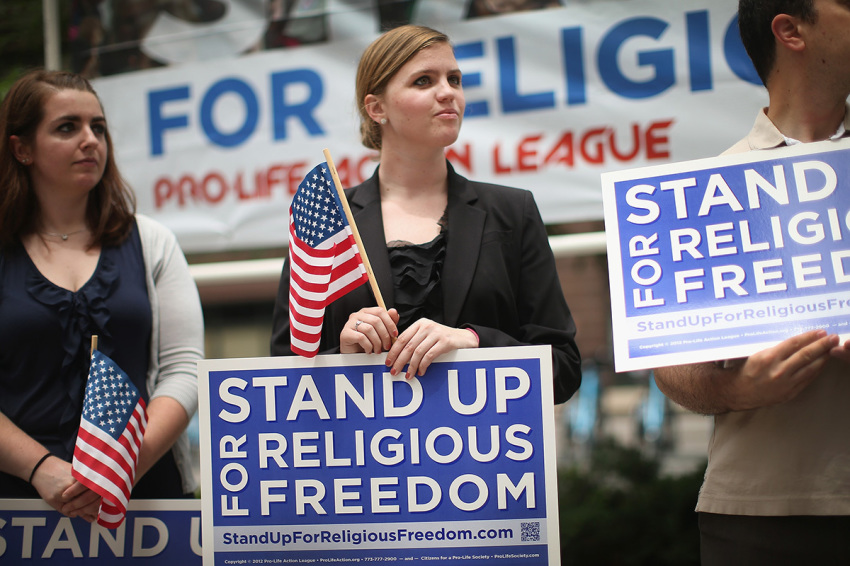These 2 Fortune 500 companies ranked best for freedom of religion

A new report reveals that American Airlines and Accenture are the top Fortune 500 companies when it comes to including religion and belief as part of their commitment to diversity, equity and inclusion as major corporations aspire to create a workplace environment that is more hospitable to freedom of religion and belief.
The Religious Freedom and Business Foundation released its fifth annual Religious Equity, Diversity and Inclusion Index and Monitor on Monday. the report's data is based on Fortune 500 companies’ responses to a survey asking them about their recognition of “religion and belief (including non-theistic beliefs) as an integral part of their overall commitment to workplace diversity, equity and inclusion.”
While not all Fortune 500 companies responded to the survey, the report includes information about whether all of the businesses have religion featured on the company’s “main diversity page” and if they sponsor “faith and belief employee resource groups.” In 2024, 429 Fortune 500 companies mentioned religion on their “public diversity pages,” accounting for 85.8% of the total. This constituted a noticeable increase from the 219 (43.8%) measured in 2023 and the 202 (40.4%) that did so in 2022.
Similarly, the number of Fortune 500 companies that mention religion-oriented employee resource groups on their public diversity pages consistently increased from 37 (7.4%) in 2022 to 43 (8.6%) in 2023 and 62 (12.4%) in 2024.
Overall, Accenture and American Airlines secured the highest possible scores on the REDI Index among the 19 Fortune 500 companies that completed the entire survey. Both companies share their “best practices with other organizations” and have religion “clearly addressed in diversity training” while providing “chaplains or other spiritual care” for employees, paying attention to “how religion impacts stakeholders” and accommodating the “religious needs of employees.”
Additionally, the two Fortune 500 companies have “clear procedures for reporting discrimination” and state that their employees “attend religious diversity conferences” and they match “employee donations to religious organizations.” They also receive the maximum number of points for celebrating or honoring “holy days of employees.”
By contrast, Aramark received the lowest score on the REDI Index among the Fortune 500 businesses that completed the survey. The company does not feature religion on its “main diversity page,” nor does it clearly address religion in its diversity training. It also received no points for paying attention to “how religion impacts stakeholders,” accommodating the “religious needs of employees” and “matching employee donations to religious organizations.”
However, Aramark does sponsor “faith and belief employee resource groups,” outlines “clear procedures for reporting discrimination” and honors or celebrates “holy days of employees.”
In addition to examining the practices embracing freedom of religion and belief based on responses from 19 Fortune 500 companies, the report looked at responses from 13 businesses that are not part of the Fortune 500. One hundred percent of these 32 companies “celebrate or honor holy days of their employees” and “report that their employees attend religious diversity professional conferences.” Last year, just 92% of responding organizations stated that their employees attended such conferences.
The share of companies participating in the REDI Index survey that “sponsor faith and belief employee resource groups” was measured at 97% in 2024, an increase from 92% in 2023. The percentage of businesses that “featured religion” on their “main or other diversity page” rose to 94% from 92%. The exact same share of responding organizations insisted that they “communicate accommodation policies for employee religious needs” in both 2023 and 2024.
Ninety-four percent of participating organizations shared “best practices with other companies or organizations” in 2024, up from 88% in 2023. The percentage of such companies that “pay attention to how religion impacts stakeholders” jumped to 94% from 80%, while the share of organizations providing “chaplains or other spiritual care for employees” increased to 87% from 80% last year.
Conversely, the 72% of REDI Index survey participants that “match employee donations to religious charities” did not budge from 2023 to 2024. The share of companies that clearly announced “procedures for reporting religious discrimination” actually dropped to 91% from 96% last year. Similarly, while 94% of the organizations said that they “clearly address religion in diversity training” in 2024, that figure constitutes a drop from the 96% that fit into that category last year.
Ryan Foley is a reporter for The Christian Post. He can be reached at: ryan.foley@christianpost.com



























